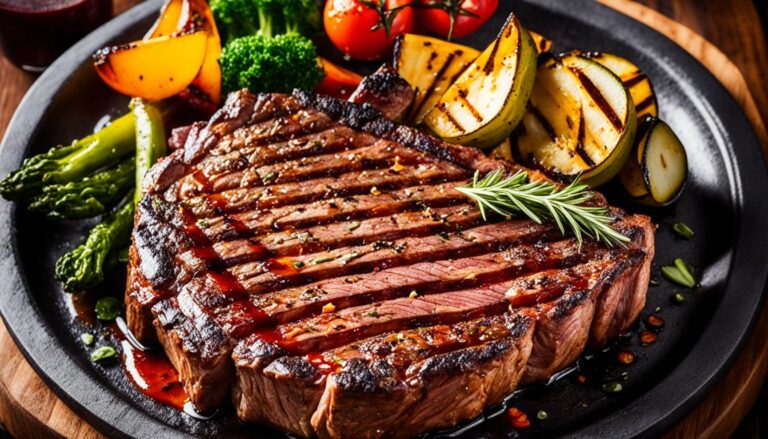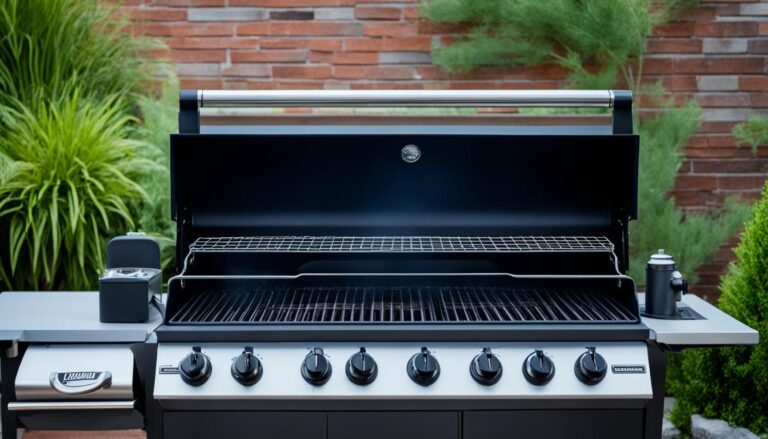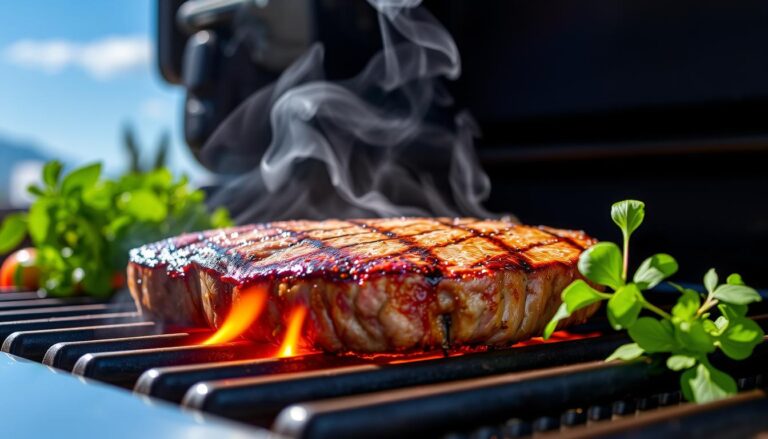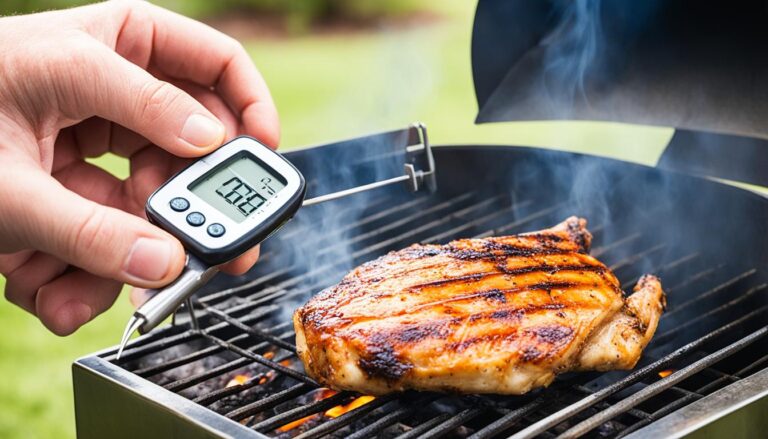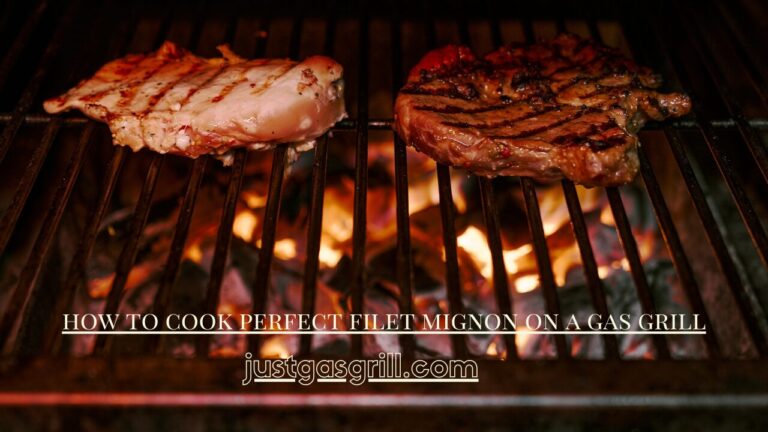
“Envision a juicy steak sizzling on a hot grill, filling the air with an aromatic scent. It reminds me of those perfect summer nights. But to achieve that ideal sear, you need to master the technique. Discover how do you sear a steak on the grill, combining heat and timing for barbecue perfection.”
Let’s explore steak searing and learn how to make that perfect crust. Whether you’re a pro or just starting, this technique will take your steaks to the next level.
Searing isn’t only for steaks; it’s great for chicken, pork chops, and roasts too. Today we’re focusing on a 16oz New York Strip Steak. We’ll show you how to pick the right oils and get that medium-rare doneness everyone loves..
Are you ready to improve your grilling skills? Let’s get the grill going and learn how to make that perfect crust. Your guests will be asking for your barbecue tips.
Key Takeaways
- Searing creates a flavorful crust on steaks and other meats
- Use high heat and the right oils for optimal searing results
- Preheat your grill for 10-15 minutes before searing
- Cook New York Strip Steaks for 5-6 minutes per side for medium-rare
- Allow steaks to rest for 5 minutes after grilling to retain juices
- Experiment with marinades and seasonings to enhance flavor
- Practice and adjust your technique to perfect your steak searing skills
Understanding the Importance of Searing
In order to cook the perfect steak, it is necessary to sear. This requires cooking the meat fast at very high temperatures until a crispy brown crust forms. Restaurateurs commonly thought that if you do this, the taste of the beef becomes more delicious and tender, but there is another explanation too.
The Maillard Reaction: Science Behind the Flavor
The magic of searing comes from the Maillard reaction, a complex process. When proteins and sugars in meat hit high heat, they change the steak’s surface into a tasty brown crust. This starts after about three to four minutes on each side during a traditional sear.
Debunking the Moisture Seal Myth
A number of people believe that by searing meat, they are locking in juices. But this is not true as it does not help to seal the moisture on your pan. Rather than that it improves flavor of steak. After cooking let the steak sit for 15 minutes more or less so that it will become juicy as much as possible.
Why Searing Enhances Taste and Appearance
Searing boosts the steak’s taste, texture, and look through caramelization. It makes a rich, dark brown crust, unlike the lighter color from browning. This makes the steak look better and taste deeper.
- Searing takes about 7-8 minutes total, including 5 minutes prep time
- Use high heat for a shorter period compared to browning
- Aim for an internal temperature of 120°F for rare, 135°F for medium-rare
Mastering searing takes practice. Try different techniques to get professional results and bring out the best in your steaks.
Preparing Your Steak for the Grill
Preparing your steak for the grill is essential to achieving a perfect sear. Remove the meat from the refrigerator 30 minutes before cooking; doing so will ensure even cooking throughout.
Next, use paper towels to dry off the steak and get rid of any excess moisture. This is necessary in order to achieve a crispy exterior. Once it’s dry, brush both sides with olive oil; the oil will help the seasonings stick while also browning the meat more effectively.

For seasoning, a mix of salt and pepper is a classic choice. For more flavor, try a dry rub with garlic powder, paprika, and herbs. Press the seasoning into the meat for better absorption.
“The secret to a great steak lies in its preparation. A well-seasoned steak is half the battle won.”
For thick cuts like ribeye or filet mignon, the reverse sear method works well. Bake the steak in a 275°F oven until it hits 100°F inside. Then, quickly sear it on the grill for a crispy crust.
| Doneness | Internal Temperature | Grilling Time (per side) |
|---|---|---|
| Rare | 120-130°F | 2-3 minutes |
| Medium-Rare | 130-140°F | 3-4 minutes |
| Medium | 140-145°F | 4-5 minutes |
| Well-Done | 160°F+ | 6-7 minutes |
Always use an instant-read thermometer to check if your steak is done. After grilling, let the steak rest for 5 minutes. This lets the juices spread evenly before you slice and serve.
Essential Equipment for Searing on the Grill
Searing a steak to perfection needs the right tools and grill types. Let’s look at what you’ll need for that perfect crust.
Choosing the Right Grill: Gas vs. Charcoal
YWhen it comes to grilling, you can either use gas or charcoal. Gas grills are user-friendly and offer good temperature control. On the other hand, charcoal grills require more effort but impart a smokey taste to food. Ultimately, what you opt for depends on whether convenience or flavor matters most.

Must-Have Tools for Perfect Searing
For a great sear, you’ll need some key tools. An instant-read thermometer helps you know when your steak is done. Long-handled tongs keep your hands safe from the heat. A grill brush is key for cleaning the grates before and after.
| Tool | Purpose |
|---|---|
| Instant-read thermometer | Measure internal temperature |
| Long-handled tongs | Safely handle steaks |
| Grill brush | Clean grates |
Importance of a Clean Grilling Surface
Clean grates are key for perfect searing. A clean surface stops steaks from sticking and spreads heat evenly. Use your grill brush to clean before and after. Preheat your grill to 450-500°F for the best crust.
Remember, controlling the temperature is crucial. For gas grills, aim for 400-450°F. On charcoal grills, use a two-zone fire for flexibility. With the right tools and techniques, you’ll be searing steaks like a pro soon.
How Do You Sear a Steak on the Grill: Step-by-Step Guide
Do you want to learn how to perfectly cook a steak by searing it? Start by preheating your grill to a blazing 500°F. Gas grills take about 15 minutes to preheat, while charcoal should be ready in 10-15 minutes.
Once the grill is hot, place your seasoned steak directly on the grates for those beautiful grill marks. Only flip once or twice, and sear each side for about two minutes. If you have a 1½-inch thick ribeye, cook for seven minutes on one side and five minutes on the other.
Use an instant-read thermometer to check if the steak has reached its desired doneness. For medium-rare, look for 130°-135°F. Medium is 135°-145°F, and medium-well is 145°-155°F.
Thicker cuts should be moved over to a cooler part of the grill to finish cooking after they’ve been seared. Let your steak rest for 10-15 minutes after taking it off the heat — this allows the juices to redistribute so that they make the entire steak juicier.
Garlic-Parmesan roasted carrots or a wedge salad would both be delicious sides for your steak dinner. And if you want some extra flavor, try topping your steak with Tuscan butter or red wine butter.

